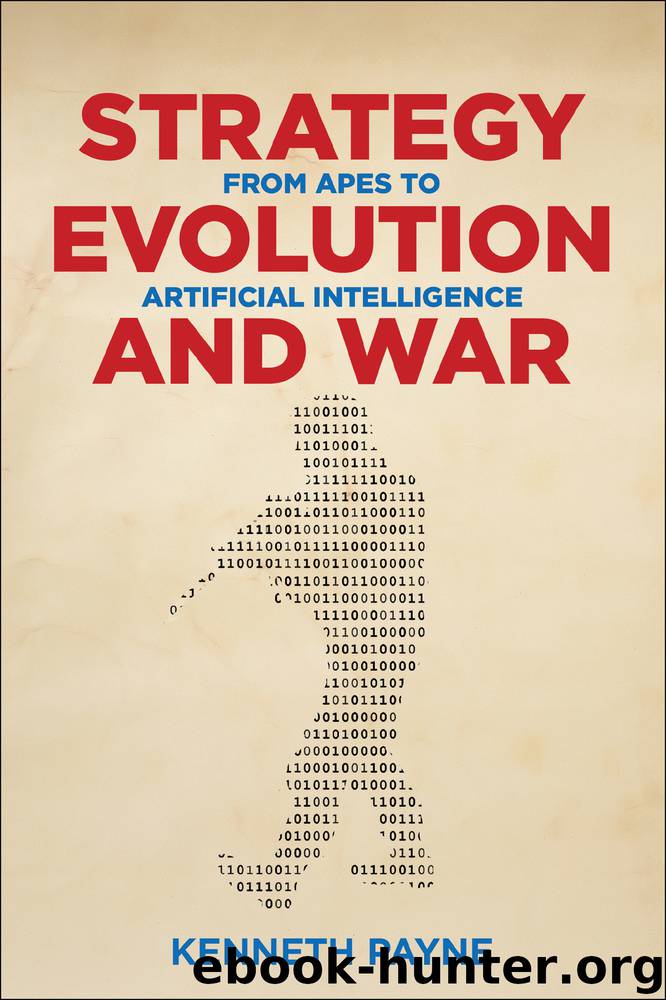Strategy, Evolution, and War by Payne Kenneth;

Author:Payne, Kenneth;
Language: eng
Format: epub
ISBN: 9781626165816
Publisher: Georgetown University Press
Published: 2018-05-30T04:00:00+00:00
Conclusion
There were no dramatic technological transformations in warfare during Clausewitz’s era. Earlier, the scientific advances of the Enlightenment had already brought more destructive firepower to the battlefield, especially in portable artillery. In a counterbalancing fashion, the science of defensive fortification had also advanced rapidly. Major technological developments were fast approaching, in the industrialization of warfare via telegraph, the steam engine, the railroad, and the development of steel hulls and submarines at sea. Rifled barrels and automatic weapons would soon transform battle decisively in the direction of the tactical defensive—which made the coming cult of the offensive spectacularly ill-timed.
But the key strategic developments of Clausewitz’s era were ideas about society itself, not ideas about technology and weaponry. This perhaps explains why Clausewitz’s ideas have proved so enduring and profound. There was an intimate connection between society and the forces employed on its behalf—which, as Paret notes, constituted a cognitive challenge for Clausewitz and others (Paret 2009). Nationalism was central to this, along with Enlightenment ideas about rationalism and egalitarianism.
Still, this new era of mass armies fighting for a modern state did little to amend the fundamental tenets of strategy in its most abstract sense. Scale clearly mattered, and as Jomini knew, the side that could concentrate its firepower decisively in battle ought to carry the day. Of course, as Clausewitz averred, the particular problems of strategy were unique to each era. In his time, scale meant that coordination was a particular problem for commanders. So, too, were logistics, and although Clausewitz did not dwell on the matter, logistics were intimately connected to professionalism and broadly based societal participation in warfare. Morale was also vital in war, not least because it underpinned the scale of armies and enhanced their fighting power by bolstering cohesion. The moral dimension of war was not a new idea, but it was recast by the French Revolution and the levée en masse. At the level of grand strategy, defense was clearly the stronger force in war when it entailed defense of the motherland and the shared values that constitute it. All members of society could feel a stake in the action.
Yet, these particulars notwithstanding, Clausewitz triumphantly succeeded in theorizing about war more broadly. He could do so because the psychological tenets of strategy had not fundamentally changed. It really was possible to theorize about war and avoid banality. The essential tenets of strategy still existed, even if they were sometimes in tension. On one hand were scale, cooperation, and concentration of the attacker; on the other were the psychological advantages of defense: cohesion, solidarity, will, and the tendency to fight that much harder for what is already possessed. Cultural variety is almost infinite, and societal change can be rapid and dramatic. Technologies and the emerging modern state changed warfare, as did new relationships between citizens and elites. Logistics, engineering, and efficient staff work were increasingly central to good strategy. But underneath the maelstrom of change, Clausewitz had discerned and articulated the enduring and evolved psychological basis of strategy.
Download
This site does not store any files on its server. We only index and link to content provided by other sites. Please contact the content providers to delete copyright contents if any and email us, we'll remove relevant links or contents immediately.
| Africa | Americas |
| Arctic & Antarctica | Asia |
| Australia & Oceania | Europe |
| Middle East | Russia |
| United States | World |
| Ancient Civilizations | Military |
| Historical Study & Educational Resources |
The Radium Girls by Kate Moore(11648)
100 Deadly Skills by Clint Emerson(4711)
The Templars by Dan Jones(4563)
Rise and Kill First by Ronen Bergman(4558)
The Doomsday Machine by Daniel Ellsberg(4260)
The Rape of Nanking by Iris Chang(4030)
Killing England by Bill O'Reilly(3901)
Hitler in Los Angeles by Steven J. Ross(3810)
Stalin by Stephen Kotkin(3733)
12 Strong by Doug Stanton(3426)
Hitler's Monsters by Eric Kurlander(3178)
Blood and Sand by Alex Von Tunzelmann(3067)
Darkest Hour by Anthony McCarten(3019)
The Code Book by Simon Singh(2882)
The Art of War Visualized by Jessica Hagy(2847)
Hitler's Flying Saucers: A Guide to German Flying Discs of the Second World War by Stevens Henry(2634)
Babylon's Ark by Lawrence Anthony(2447)
The Second World Wars by Victor Davis Hanson(2429)
Tobruk by Peter Fitzsimons(2383)
